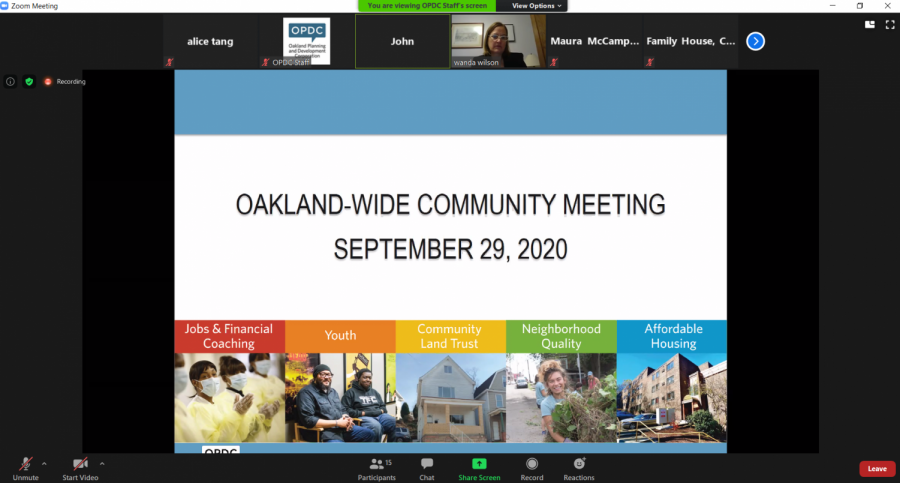Pitt withdraws Central Oakland housing development from Institutional Master Plan
Oakland Planning and Development Corp. held a meeting Tuesday evening via Zoom.
September 30, 2020
Pitt students who wish to live in expanded University-owned housing in Central Oakland may need to wait just a few more years.
The Oakland Planning and Development Corp. held a virtual community-wide meeting Tuesday evening, and Pitt provided several updates about its Institutional Master Plan, including the removal of a planned housing development in Central Oakland. The housing development was important to students, since it acknowledged significant unmet demand for on-campus student housing.
An IMP is a formal, legally binding document that large institutions submit to the City. Each university in Pittsburgh has its own IMP, and Pitt’s provides specific details related to City regulations such as building height and mass, parking urban design and neighborhood compatibility.
Wanda Wilson, OPDC’s executive director, led the meeting. Wilson introduced Mary Beth McGrew, associate vice chancellor for planning, design and real estate, who presented a status update on Pitt’s IMP. Wilson discussed the development of Pitt’s IMP over the years.
“Pitt’s Institutional Master Plan is in the process. We’ve had several meetings over the past couple of years,” Wilson said. “It’s been in a relatively quiet phase while the City has been reviewing the document in advance of going to the Planning Commission.”
McGrew said the City is currently reviewing the 444-page IMP, and Pitt is working to incorporate comments. The next step of the process is for the Planning Commission to recommend adoption by the City Council, which would require additional oversight meetings. Although Pitt’s IMP had been discussed for the last several years, and is now behind its original schedule, she said final action and approval would most likely occur in the first few months of 2021.
“We’re still thick in the process and we hope to move things along,” McGrew said. “The City is working toward setting a Planning Commission briefing for us and it’s likely that there will be multiple briefings or hearings because this plan is not a small one.”
McGrew said the removal of the Central Oakland Housing was not out of unimportance, but due to outside factors. She said part of this decision was based on comments and concerns from the community, and Pitt wanted to make sure community residents understood the height of the housing and whether it would fit into the neighborhood.
The Central Oakland Housing planned on having 800 apartment-style beds along with functioning as mixed-use buildings. This would have possibly included retail and other community-shared spaces on the ground floor. This new housing development would have also created additional on-campus gathering areas for students.
The other part of the decision stemmed from the City currently developing a comprehensive neighborhood plan for Oakland. McGrew said Pitt will go through the current Oakland neighborhood planning process to “better” inform the future development of the Central Oakland site.
“We thought it would make some sense to see if our housing related to that plan, and that it became part of the plan,” McGrew said.
Although the Central Oakland housing site is currently removed from Pitt’s IMP, McGrew said the University anticipated a future IMP amendment regarding the housing site after conducting more meetings and integrating it into the Oakland plan.
“We still think it’s an important site for the University for housing,” McGrew said. “It pulls the students closer to the University and it also is part of the plan to move some of the students out of the neighborhood.”








